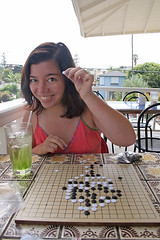I've been having an on again, off again intellectual war with my sixth grade class about whether or not you can call zero the middle of all numbers. I maintain that you cannot, since to call something the middle means that it divides something into equal parts, which, since there are infinite positive and negative numbers, cannot be the case; you can't call two infinites equal in the same way that two finites are equal. They maintain that you can call zero the middle of all numbers, since, see, there is a correlation between every positive and every negative number. Hence, equality! So, zero is the middle!
Frankly, it just tickles me that they find the discussion at all interesting. They keep bringing it up, too. I should spring some of the dialogues of Galileo on them, assuming the role of Simplicius...


2 Comments:
The number line! It's art, not science. Decartes, Newton, et al. Calculus is for calculation, not science. Zero as the middle of all numbers makes for a nice system of useful computations, but it's not true. Zero is not numerical and negative numbers are just positive numbers with the notion of a lack or debt tacked onto them.
Hegel's system of truth has wrecked havoc on truth. The dialetic discovers truth, it does not define it; truth is not a fad.
Yeah, but you already know this.
Of course you can show that infinities are equal, when they are in one-to-one correspondence.
There are "the same number" of integers (signed numbers) as there are positives:
Proof:
1. Let k be an integer greater than zero.
Then if k is odd, let n = -(k-1)/2; otherwise let n=k/2.
So each positive is associated with exactly one integer.
2. Let n be an integer (positive, zero, or negative). If n is negative, let k=-2n; otherwise let k=2n+1.
So each integer is associated with exactly one integer greater than zero.
Hence, there are "the same" number of positives as integers. QED
A note: We need to be careful with arguments about zero, especially when writing them in checks. It matters quite a bit where they are placed.
Regarding Hegel, I know next to nothing (hee hee), so I will ask Uncle Gilbert: "Let the man in the street be forgiven, if he adds that the "remarkable difference" seems to him to be that St. Thomas was sane and Hegel was mad. The moron refuses to admit that Hegel can both exist and not exist; or that it can be possible to understand Hegel, if there is no Hegel to understand." [GKC, St. Thomas Aquinas CW2:514-515]
Post a Comment
<< Home